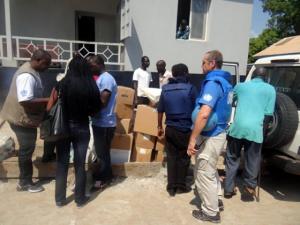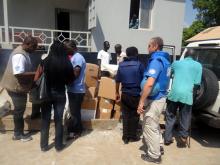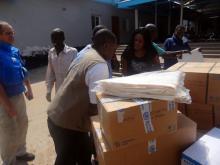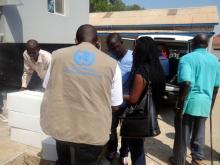WHO and Health Cluster Partners steps up response to the critical health needs in Juba in response to armed conflict that eruped on the 8th July 2016
Juba, 09 July 2016 -- WHO delivers medical supplies to Juba Teaching Hospital and Juba Protection of Civilian (POC) in response to armed clashes that erupted between South Sudan rival forces loyal to President Salva Kirr and those loyal to the first Vice president, Riek Machar in Juba yesterday. WHO is leading the response to provide emergency health access to victims of the clashes. Health cluster partners have been coordinated, mobilized and provided support with critical pharmaceuticals to sustain the response in the Juba PoC, Juba Teaching Hospital.
In the PoC, over 35 trauma injuries including three pregnant women have been recorded, and an estimated 150 causalities recorded in Juba Teaching Hospital. The escalating crisis in the last two days has further depleted the exiting short supply of pharmaceuticals in the secondary health care facility.
Today, WHO team visited Juba Teaching Hospital to assess the situation and to provide initial critical pharmaceuticals to support the response. The visiting WHO team donated one WHO trauma kit sufficient to conduct 500 surgeries, 27 body bags, 27 boxes of IV Fluids (four boxes of Normal Saline, three boxes of Dextrose, 20 boxes of Ringers Lactate), 25 iodine solution 10%, one box of fracture kit, two boxes of gloves, one box of IV giving set 22 gage, one box of IV giving set 30 gage to treat the increasing numbers of injured patients in Juba. Preparations are underway to also provide two trauma kits to health cluster partners in the POC to support the response in addition to advocacy with the humanitarian community to ensure that the necessary human resource is available to support the response in the PoCs.
“WHO is committed to ensuring that all South Sudanese continue to have access to health services, including those in the hardest to access areas through the provision of emergency lifesaving medicines, trauma kits, interagency emergency health kits and antimalarial drugs which currently are urgently needed,” said Mr Evans Liyosi, the officer in charge for WHO South Sudan.
The Director of Accident and Emergency, Dr Abraham Adut Abenego at the Juba teaching hospital, acknowledge the continued support by WHO and health cluster partners and welcomed the donation as a valuable and timely contribution to the response. The donation of these surgical and medical supplies at this critical time of the country is a major paradigm shift of the hospital capacity to respond as it enhances our ability to carry out life savings interventions says Dr Adut.
“The ongoing crisis has led to the closure of many health facilities and access for the injured civilians. human resources for health is also becoming impossible to access in addition to shortages of basic and lifesaving medicines, medical supplies, laboratory reagents in the health facilities which also are fast dwindling with limited access for replenishing” says Ms Magda Armah, the Health Cluster Coordinator. In all this, WHO is determined to meet the huge gap in supplies; this requires lots of financial resources added Mr Liyosi.
In light of the ongoing response and the increasing health needs, WHO has appealed for US$ 17.5 million to support health interventions until the end of 2016; however as at now WHO has only received US$ 4.3 million, leaving a funding gap of 75.7%. The health cluster is also struggling with a major shortfall of 68% in its total funding needs; only 28% of its US$ 110 million requirements have been met. The health cluster core pipeline which supports health facility implementation is majorly hit as it is only 11% funded. In the coming month, the health situation is expected to deteriorate further among displaced people and host communities due to the continued crisis and escalating needs.
__________________________________________
For more information, please contact:
Mr Evans Liyosi - +211-955037645; liyosie [at] who.int (liyosie[at]who[dot]int)
Ms Magda Armah - +211-955036448; armahm [at] who.int (armahm[at]who[dot]int)
Ms Jemila M. Ebrahim - +211950450007; ebrahimj [at] who.int (ebrahimj[at]who[dot]int)






